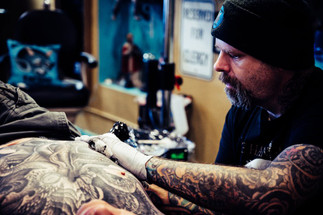Aug 14th 2024
How Do Coil Tattoo Machines Compare to Rotary Machines?
When it comes to tattooing, the choice of equipment can significantly impact the artist's work and the client's satisfaction. Two popular types are coil and rotary tattoo machines, each with its unique features and benefits. This blog will explore how these machines compare, helping both artists and enthusiasts understand their differences.
Understanding Coil Tattoo Machines
Coil tattoo machines, known for their distinctive buzzing sound, are the traditional choice for tattoo artists. Utilizing an electromagnetic circuit, these machines drive the needle up and down to deposit ink into the skin. The mechanics behind coil tattoo machines offer artists a high level of control over the tattooing process, allowing for precise line work and shading that can be adjusted by changing the machine's voltage.
The versatility of coil machines makes them a favored tool for creating intricate designs. Their ability to handle various needle groupings and configurations adds to their appeal, enabling artists to execute a wide range of tattoo styles with a single machine. However, mastering a coil machine's settings to optimize its performance requires experience and skill.
Exploring Rotary Tattoo Machines
Rotary tattoo machines, on the other hand, operate quite differently. These machines use an electric motor to rotate the needle, which makes them quieter and generally smoother in operation than their coil counterparts. Because of their consistent needle movement, rotary machines offer a gentler tattooing experience, which can be less painful for the client.
One of the main advantages of rotary machines is their simplicity and ease of use, making them a great choice for both seasoned tattoo artists and those just beginning their career. The straightforward design minimizes maintenance and reduces the risk of mechanical failure, allowing artists to focus more on their artwork.
Comparing Performance: Precision and Versatility
When it comes to the precision of tattooing, coil machines typically offer superior control due to their adjustable settings. This control allows artists to execute sharp, detailed line work and nuanced shading. Rotary machines, while known for their smooth performance, may not provide the same level of precision for detailed work but excel in creating consistent and even color fill.
Comparing Comfort: Noise and Vibration
A significant difference between the two types of machines is the level of noise and vibration they produce. Coil machines can be loud and vibrate considerably, which might intimidate some clients and contribute to artist fatigue over long tattooing sessions. Rotary machines are much quieter and offer a smoother operation, which can enhance the overall experience for both the client and the artist.
Maintenance and Durability
Maintaining your tattoo machine is crucial for its performance and longevity. Coil machines, with their more complex design and adjustable parts, require regular maintenance to stay in optimal shape. Conversely, the simpler construction of rotary machines means they generally require less upkeep and can be more durable over time.
Price and Accessibility
In terms of cost, coil tattoo machines can vary widely, reflecting the range in customization and quality available. They can be both an entry-level choice and a high-end investment. Rotary machines tend to have a more consistent price range, often making them an accessible option for artists at all levels of their career.
Making the Best Choice for Your Tattooing Style
The decision between using a coil or rotary tattoo machine ultimately depends on the artist's personal style, comfort, and the specific requirements of the tattoo being created. Artists may find that experimenting with both types offers the best understanding of what suits their technique and their clients' needs.
Making Your Choice: Coil vs. Rotary Tattoo Machines
Choosing between a coil and rotary tattoo machine comes down to personal preference, the specific needs of a tattooing session, and the type of artwork being created. Understanding these differences can help inform your choice and improve the tattooing experience. Ready to make your choice? Explore our options and find what suits your style best.

